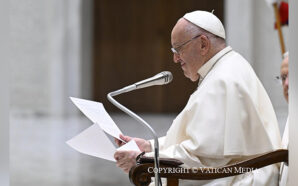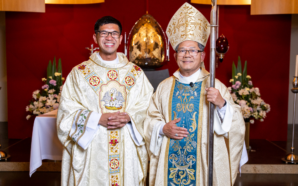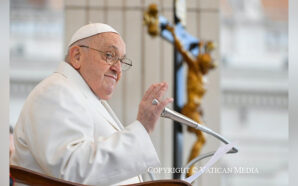Jesuit Fr. James Martin says Catholic communicators today needs to focus always on the person of Jesus and endeavour to reach others where they are in life using the best media languages possible.
Visiting the media production facilities along with the management, members and consultors of the Vatican’s Dicastery for Communication, of which Vatican News is part, American-born Fr James Martin, SJ, shared his experience and ideas on how the Church can communicate more effectively, reaching believers and non-believers with the Gospel message.
Fr. Martin is Editor At Large at America Media based in New York, a leading provider of editorial content on the Catholic Church, faith and culture, with a variety of publications, including America Magazine.
Inclusive and truthful communication
Pope Francis addressed the Dicastery for Communication’s recent plenary assembly on Saturday 12 November, and in his prepared text underscored the responsibility of communicators.
He encouraged media professionals to always seek the truth, to combat hate speech and to give voice to those who have no voice. The Pope underscored that the voice of God must resonate in their work.
RELATED: Pope: communication must be inclusive and truthful
In his off-the-cuff remarks, the Pope noted the presence in the audience of Fr. Martin and recalled his book, “Learning to Pray: A Guide for Everyone” encouraging everyone to read it.
The Pope pointed out that being a communicator means “to go forward, to journey, to take risks…with the conviction that I am sharing my life with my…Christian and human values.” He also reiterated that “the communicator must always take risks, must always be on the road, always engaging with life.”
Sharing the Gospel today
During his visit to the headquarters of Vatican News, Fr. Martin spoke about the discussions at the plenary, looking at how best to communicate the Gospel in the modern era.
At its most basic level, all communication should focus on the person of Jesus, he said, since there can be tendency especially today to get lost in internal political questions and debates that can detract from sharing the core message of the Gospel.
“It’s the focus on the person of Jesus” that matters most and in this way can lead people to deepen or renew their faith. This effort can help us rise above what can be partisan differences, he stressed.
Meet people where they are
In terms of reaching believers and non-believers alike through the media, Fr. Martin said, “it’s meeting people where they are,” just as Jesus did in throughout His ministry.
This means going physically where people are to meet them, over and above where it most often happens today in digital media, via Facebook or Twitter.
The second point he stressed is to use common, understandable languages to dialogue and engage with others, whether the spoken word or the media languages that have created new cultures of human interaction.
He recalled how Jesus “spoke in the language of fishermen, even though he was a carpenter,” using “very simple terms and the parables and the stories.”
So too, in different ways, Catholic media engage in social media speaking people’s languages, he said. “And I think if we do that, meet people where they are and speak in their language, we can’t go wrong.”
Foster a culture of encounter
Fr. Martin also offers pastoral ministry to the LGBTQ community in the US, and has received encouragement from Pope Francis in this outreach to help Catholics foster a “culture of encounter” that bring everyone closer together, enriching us in our differences.
He met again with Pope Francis in a private audience during his visit to Rome in November, and said they discussed LGBTQ Catholics. Fr. Martin said the Pope encouraged him in this ministry, as the Pope has done so personally to other groups and individuals providing pastoral service to that community within the Church.
Fr. Martin said, “we’ve come a very long way…I think people are more and more welcoming to LGBTQ Catholics as they come to know them as human beings. And for Pope Francis, it’s all about making sure everyone feels welcome in the Church.”
With thanks to Vatican News, where this article originally appeared.








